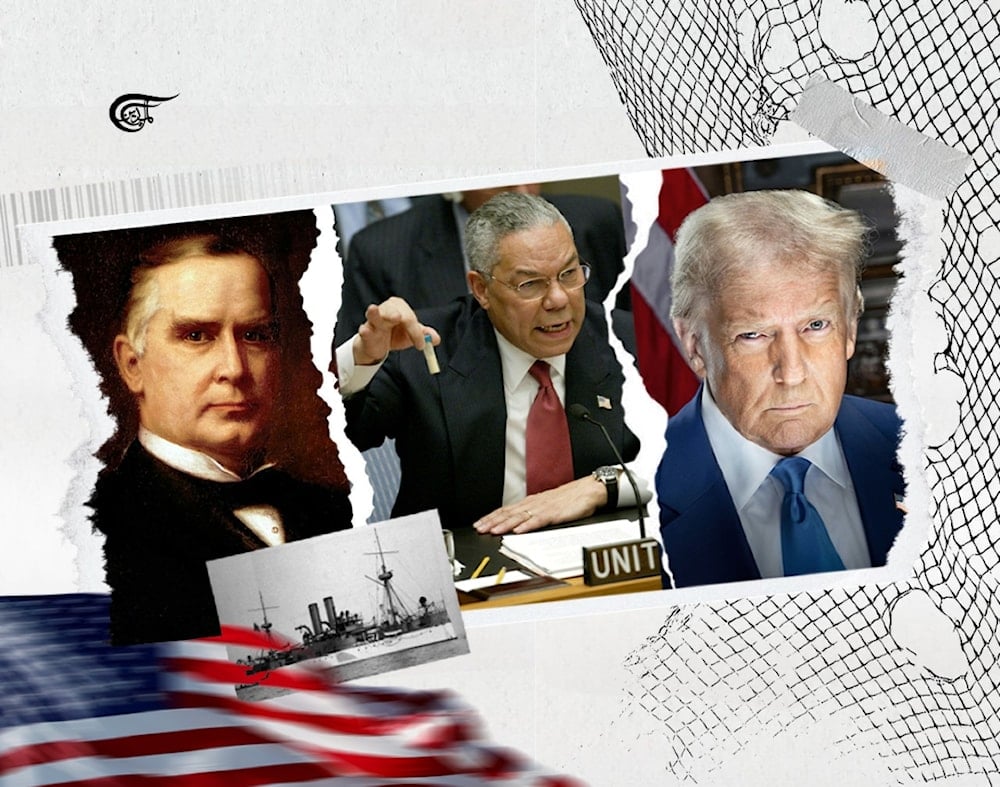Trump and his distant predecessor
Trump represents a danger to international coexistence and a return to the most brutal and shameless phase of imperialism.
-

Imperialism exists, and it will continue to generate pain and death everywhere, to destroy the environment, to wage wars, and to sow poverty everywhere. (Al Mayadeen English; Illustrated by Batoul Chamas)
By exalting the figure of William McKinley, president of the United States between March 4, 1897 and September 14, 1901, Donald Trump is trying to find in the political history of the United States a universally acclaimed precedent for his controversial policies. McKinley died assassinated, Trump was miraculously spared the same fate on July 13, 2024 in Pennsylvania. But unlike the New Yorker, McKinley was a man of the political class. Except for a short period of two years (1869-1871) when he practiced law, his entire life was spent in the world of politics.
At the age of 33, McKinley entered the House of Representatives for the Republican Party. In 1890, he proposed and won approval for a law that increased tariffs on imports. Shortly afterwards, he was elected governor of Ohio and, in 1897, president of the United States. It was during his mandate that the United States became a world power: he achieved the annexation of Hawaii by taking over the four-million dollar debt of the local government, and the following year, he took advantage of the defeat that the Cuban patriots had inflicted on the Spanish army to get involved in the war of Cuban independence and seize that island, Puerto Rico, the Philippines, and Guam. The pretext was to “provide aid” to the Cuban patriots, even though they did not need it. However, in order to strip Spain of its territories in the Caribbean and the Pacific, Washington needed to enter that war.
Since the Cubans did not ask for their help, it was necessary to forge an incident that would infuriate American public opinion and justify US intervention. The self-attack of the battleship Maine (anchored in Havana Bay to evacuate the American citizens living in Cuba) which mysteriously blew up on February 15, 1898, prompted the entry of the United States into a war that had already been won by the Cubans but was taken from them precisely by McKinley. It was under his presidency that the United States went from being a regional power in Central America and the Caribbean, and started to take the first steps in the construction of a global empire.
And it is this man, McKinley, a supporter of economic warfare with his tariffs; of direct military action, as in the case of the war against Spain; or appealing to money to buy an island like Hawaii, who has not by chance been repeatedly exalted by Trump. It was he who, having defeated the Spanish monarchy in the Philippines and Guam, ordered the Pentagon cartographers to include those two distant Pacific islands in their new maps of the United States.
This brief sketch allows us to decipher and put into perspective some of Trump's initiatives. For example, ordering the renaming of the Gulf of Mexico and renaming it the Gulf of America. His blind trust in import tariffs has its most notable antecedent in McKinley, only that in a world economy as interconnected as the current one, that policy is doomed to a resounding failure, which Trump himself will pay dearly for. As an unscrupulous businessman, he believes that everything has a price, that anything can be bought or sold. Patriotism, honor, or dignity are meaningless words for the Yankee tycoon.
If McKinley acquired Hawaii, why not do the same with Greenland, especially when Denmark and the European governments display a scandalous apathy in the face of Trump's outburst? Why not use economic blackmail to turn Canada into the 51st state of the United States? And although for now there would be no need for a self-attack, the current version of [the battleship] Maine, lies, fake news, and the cowardice or passivity of many politicians can have the same effect. If George W. Bush convinced the world that there were “weapons of mass destruction in Iraq,” which was ostensibly a falsehood, why would the powerful media apparatus controlled by the United States on a global scale not be capable of deceiving half the world when it propagates such a scandalous lie as “the presence of Chinese soldiers in the Panama Canal”, or that its administration is surreptitiously run by the Chinese Communist Party? Or convince world public opinion that anyone who enters the United States illegally is a criminal, as stated by the serial liar Marco Rubio?
Beyond these parallels, what is certain is that with his bluster and contradictions, Trump represents a danger to international coexistence and a return to the most brutal and shameless phase of imperialism. Those naive souls who thought that imperialism had disappeared when it was replaced by a benevolent globalization, are now making themselves scarce. Imperialism exists, and it will continue to generate pain and death everywhere, to destroy the environment, to wage wars, and to sow poverty everywhere. Trump's illusory attempt to resurrect US unipolarism, or “American superiority”, is a chapter locked under seven keys by the history of an international system whose current architecture has been radically and irreversibly modified in the direction of a multipolar power configuration, whose gravitation is growing day by day.

 Atilio A. Boron
Atilio A. Boron
 5 Min Read
5 Min Read











